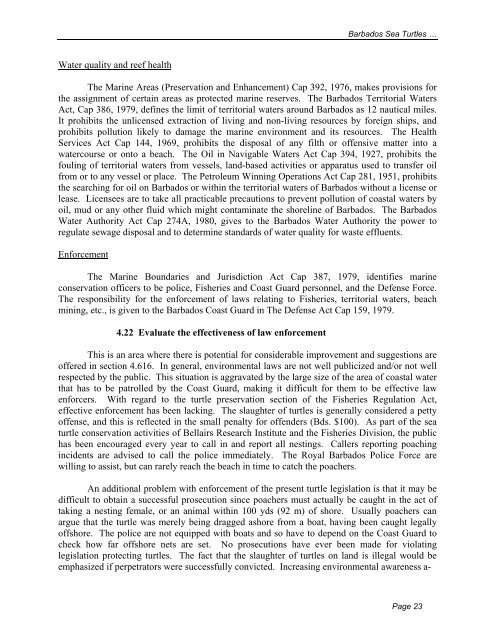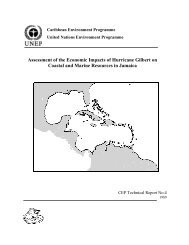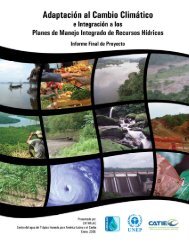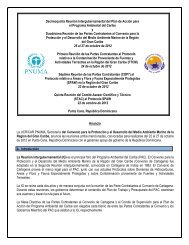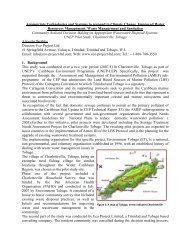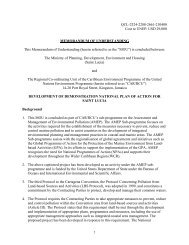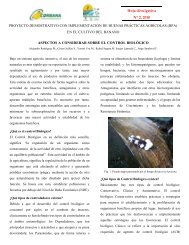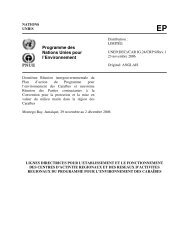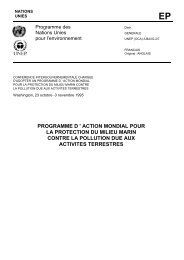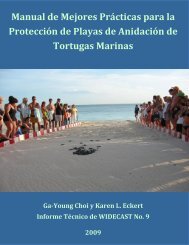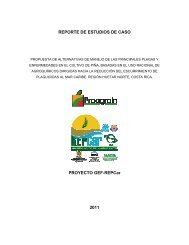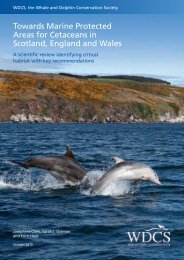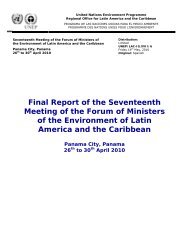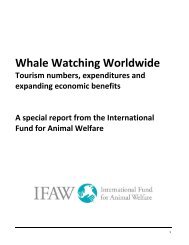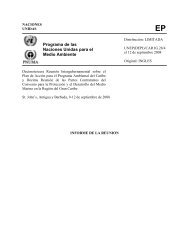Sea Turtle Recovery Action Plan for Barbados - WIDECAST
Sea Turtle Recovery Action Plan for Barbados - WIDECAST
Sea Turtle Recovery Action Plan for Barbados - WIDECAST
Create successful ePaper yourself
Turn your PDF publications into a flip-book with our unique Google optimized e-Paper software.
<strong>Barbados</strong> <strong>Sea</strong> <strong>Turtle</strong>s …<br />
Water quality and reef health<br />
The Marine Areas (Preservation and Enhancement) Cap 392, 1976, makes provisions <strong>for</strong><br />
the assignment of certain areas as protected marine reserves. The <strong>Barbados</strong> Territorial Waters<br />
Act, Cap 386, 1979, defines the limit of territorial waters around <strong>Barbados</strong> as 12 nautical miles.<br />
It prohibits the unlicensed extraction of living and non-living resources by <strong>for</strong>eign ships, and<br />
prohibits pollution likely to damage the marine environment and its resources. The Health<br />
Services Act Cap 144, 1969, prohibits the disposal of any filth or offensive matter into a<br />
watercourse or onto a beach. The Oil in Navigable Waters Act Cap 394, 1927, prohibits the<br />
fouling of territorial waters from vessels, land-based activities or apparatus used to transfer oil<br />
from or to any vessel or place. The Petroleum Winning Operations Act Cap 281, 1951, prohibits<br />
the searching <strong>for</strong> oil on <strong>Barbados</strong> or within the territorial waters of <strong>Barbados</strong> without a license or<br />
lease. Licensees are to take all practicable precautions to prevent pollution of coastal waters by<br />
oil, mud or any other fluid which might contaminate the shoreline of <strong>Barbados</strong>. The <strong>Barbados</strong><br />
Water Authority Act Cap 274A, 1980, gives to the <strong>Barbados</strong> Water Authority the power to<br />
regulate sewage disposal and to determine standards of water quality <strong>for</strong> waste effluents.<br />
En<strong>for</strong>cement<br />
The Marine Boundaries and Jurisdiction Act Cap 387, 1979, identifies marine<br />
conservation officers to be police, Fisheries and Coast Guard personnel, and the Defense Force.<br />
The responsibility <strong>for</strong> the en<strong>for</strong>cement of laws relating to Fisheries, territorial waters, beach<br />
mining, etc., is given to the <strong>Barbados</strong> Coast Guard in The Defense Act Cap 159, 1979.<br />
4.22 Evaluate the effectiveness of law en<strong>for</strong>cement<br />
This is an area where there is potential <strong>for</strong> considerable improvement and suggestions are<br />
offered in section 4.616. In general, environmental laws are not well publicized and/or not well<br />
respected by the public. This situation is aggravated by the large size of the area of coastal water<br />
that has to be patrolled by the Coast Guard, making it difficult <strong>for</strong> them to be effective law<br />
en<strong>for</strong>cers. With regard to the turtle preservation section of the Fisheries Regulation Act,<br />
effective en<strong>for</strong>cement has been lacking. The slaughter of turtles is generally considered a petty<br />
offense, and this is reflected in the small penalty <strong>for</strong> offenders (Bds. $100). As part of the sea<br />
turtle conservation activities of Bellairs Research Institute and the Fisheries Division, the public<br />
has been encouraged every year to call in and report all nestings. Callers reporting poaching<br />
incidents are advised to call the police immediately. The Royal <strong>Barbados</strong> Police Force are<br />
willing to assist, but can rarely reach the beach in time to catch the poachers.<br />
An additional problem with en<strong>for</strong>cement of the present turtle legislation is that it may be<br />
difficult to obtain a successful prosecution since poachers must actually be caught in the act of<br />
taking a nesting female, or an animal within 100 yds (92 m) of shore. Usually poachers can<br />
argue that the turtle was merely being dragged ashore from a boat, having been caught legally<br />
offshore. The police are not equipped with boats and so have to depend on the Coast Guard to<br />
check how far offshore nets are set. No prosecutions have ever been made <strong>for</strong> violating<br />
legislation protecting turtles. The fact that the slaughter of turtles on land is illegal would be<br />
emphasized if perpetrators were successfully convicted. Increasing environmental awareness a-<br />
Page 23


